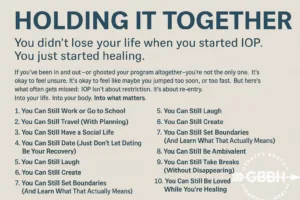You didn’t lose your life when you started IOP. You just started healing.
If you’ve been in and out—or ghosted your program altogether—you’re not the only one. It’s okay to feel unsure. It’s okay to feel like maybe you jumped too soon, or too fast. But here’s what often gets missed: IOP isn’t about restriction. It’s about re-entry. Into your life. Into your body. Into what matters.
This list isn’t a checklist of what’s “allowed.” It’s a reminder that your life can still have movement, connection, joy, and agency—even while you’re doing the work. Especially if you’re looking for a flexible IOP in Boston, MA that meets you where you are instead of demanding perfection.
You can restart at any time. No re-explaining. No shame. Just a continuation of something still worth building.
And it can start here.
1. You Can Still Work or Go to School
Let’s clear something up: IOP doesn’t mean your calendar disappears. It’s built for people with responsibilities.
Most IOP schedules are structured to support real life. Morning sessions before your shift. Evening groups after class. Flex time if you’re juggling both.
You don’t have to choose between healing and providing, or learning and recovering. You just have to be willing to show up honestly—because healing isn’t about stepping out of your life. It’s about stepping into it more clearly.
2. You Can Still Travel (With Planning)
Contrary to what some might think, IOP doesn’t mean locking yourself down indefinitely.
A weekend trip to visit your sibling? A few days to recharge by the coast? That’s still possible. Just communicate. Let your therapist or case manager know what you’re planning. We’ve worked around everything from business travel to family events.
Recovery doesn’t mean you’re stuck. It means you’re supported. The key difference is staying connected while you move, not disappearing while overwhelmed.
3. You Can Still Have a Social Life
Yes, even in early recovery. You are allowed to laugh with your friends, go to the movies, play trivia at the bar (maybe with a soda instead of a beer), and exist in public.
You may choose to step back from certain scenes—and that’s okay too. But it’s not about cutting yourself off from joy. It’s about choosing connection that doesn’t cost your peace.
IOP can even help you reframe how you socialize. You might start asking: “Does this space help me feel seen, or just distracted?”
There’s freedom in that.
4. You Can Still Date (Just Don’t Let Dating Be Your Recovery)
If you’ve heard the “don’t date for a year” line, we get why it might feel patronizing. So here’s our version:
You can date. But you can’t outsource your healing to someone else.
If you’re grounded, doing your work, and clear about your needs—dating is a human experience, not a moral hazard.
But if your nervous system still feels like a pinball machine and you’re hoping someone will save you from yourself? That’s a signal to slow down.
You don’t need to be perfect to love or be loved. You just need to be present.
5. You Can Still Laugh
This one’s easy to forget when you’re knee-deep in group therapy.
There’s this idea that healing has to be solemn. Serious. Full of weighted silences and Kleenex boxes.
But in most IOP rooms, laughter happens just as often as tears. Someone calls their anxiety “a squirrel with a taser.” Another compares relapse to “a romantic comedy where you’re dating your worst impulse.”
Humor disarms shame. It keeps things human. And if you’re still laughing while you’re healing? That’s not a contradiction—it’s a sign you’re alive.
6. You Can Still Create
The number of clients who rediscover creativity in IOP is… honestly, kind of beautiful.
Some hadn’t touched a sketchbook in years. Others stopped playing music or writing poems. Recovery reopened that door—not by demanding productivity, but by reducing the noise that drowned it out.
You don’t have to be a capital-A Artist. You just have to be willing to touch that part of yourself again. It can be messy. It can be playful. It can be small.
Creativity isn’t the opposite of healing. It’s often the result of it.
7. You Can Still Set Boundaries (And Learn What That Actually Means)
Early recovery often wakes up something new: the sudden urge to protect your energy.
You might start realizing certain people only call when they need rescuing. Or that saying “I’m tired” gets treated like an invitation, not a limit.
IOP helps you build language for all of that.
You’ll learn how to say “not today” without guilt. How to protect your space without needing a PowerPoint of justifications. How to feel what’s yours to carry—and what’s not.
Because boundaries aren’t walls. They’re doors you control.
8. You Can Still Be Ambivalent
This one’s big.
You do not need to be 100% certain, 100% sober, or 100% convinced this will work in order to return to IOP.
You’re allowed to feel unsure. Ambivalence is part of most recovery stories. You can be both tired of how you’ve been living and not totally sold on what’s next.
That’s normal. That’s human.
What matters more than being “ready” is being willing. Even if that willingness is quiet and unsteady.
9. You Can Still Take Breaks (Without Disappearing)
One of the most common reasons people ghost treatment? Shame. They missed one session. Then another. And suddenly it felt too embarrassing to show their face again.
So they vanish—because it feels safer than walking back in.
We’re here to tell you: You can take breaks. You can pause. You can miss sessions.
You just have to tell someone.
We don’t shame people for needing space. We just want to keep the door open. If you’re thinking about stepping back in, maybe through IOP in Needham, MA, we’re here.
Not to rehash what happened. Just to pick up where you left off.
10. You Can Still Be Loved While You’re Healing
You are not broken. You are not a failure. You are not a project someone gave up on.
You are in progress.
The idea that you have to “fix yourself” before you’re allowed to be in community is a lie. Healing doesn’t disqualify you from love. It invites you to receive it differently.
In IOP, you’re not alone. Not weird. Not behind.
You’re just… a person. Trying. Continuing. Beginning again.
And that’s more than enough.
FAQs: What If I Already Ghosted My Program?
Can I come back if I ghosted IOP?
Yes. Absolutely. Many IOP clients leave and return. Life happens. What matters is that you’re thinking about re-engaging now. You’re still welcome.
Will I have to explain why I left?
Not in detail. You can say, “I got overwhelmed,” or “I panicked,” or “I needed space.” Your team isn’t here to punish you—we’re here to support what’s next.
Will I have to start over?
Usually not. We’ll work with you to assess where you’re at and build a plan that makes sense from there. This isn’t about resetting—it’s about continuing.
What if I’m still unsure if I want to stop using completely?
That’s okay. IOP supports people in many stages of change. You don’t have to know all your answers. You just need to be open to the questions.
Do people judge me if I come back after ghosting?
No. In fact, we admire it. It takes courage to return. Anyone who’s done it knows that. You won’t be shamed here—just welcomed.
Ready to try again—without starting over?
Call (888) 450-3097 or visit our IOP program in Boston, Massachusetts to learn more about how healing can still fit your life.


